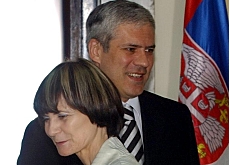Kosovo casts pall on Swiss-Serbian relations

The Serbian president, Boris Tadic, has criticised Switzerland for suggesting the province of Kosovo should be independent.
His comments came after meeting Swiss Foreign Minister Micheline Calmy-Rey in Belgrade on Friday.
Tadic told reporters he was opposed to breaking up Serbia-Montenegro. He added that partitioning the country would constitute a “dangerous detonator” for the entire region.
Calmy-Rey’s diplomatic advisor, Roberto Balzaretti, said later that the foreign minister had insisted during her meeting with Tadic that Kosovo could not return to its previous status within Serbia-Montenegro.
She also repeated earlier remarks made by the Swiss ambassador to the United Nations in New York. Peter Maurer spoke of an “evolution towards a formal independence” for Kosovo at a Security Council meeting on May 27.
He said at the time that it was neither “desirable nor realistic” to imagine that the province would return to Serbian sovereignty.
Maurer’s speech did not go down well with Swiss parliamentarians either, who criticised this change in policy.
Finding solutions
Calmy-Rey, who is on a two-day visit to Serbia-Montenegro, said it was up to the parties involved in the Kosovo conflict to find solutions for the future of the province. She added that Bern was prepared to help Kosovo Albanians and Serbs sit down and talk.
Tadic and the Serbian foreign minister, Vuk Draskovic, told Calmy-Rey that they understood the Swiss position but reaffirmed that Belgrade was more interested in granting Kosovo “more than autonomy, but less than independence”.
Speaking ahead of the Swiss foreign minister’s arrival, an advisor to Serbian Prime Minister Vojislav Kostunica had called on Switzerland to “remain neutral” and not take a position on the future of Kosovo at this stage.
The province officially remains part of Serbia-Montenegro, the union that replaced Yugoslavia. But it has been under UN and Nato administration since a 78-day Nato-led air war that halted a Serb crackdown on ethnic Albanians in 1999.
Calmy-Rey met Kostunica on Friday, when she talked mainly about the “human ties” between the two countries. Around 200,000 Serbs live in Switzerland.
The Swiss foreign minister also raised the issue of war criminals. She made particular mention of Bosnian-Serb leaders Ratko Mladic and Radovan Karadzic, who have been indicted by The Hague war crimes tribunal, but have so far escaped arrest.
swissinfo with agencies
In spring 1999, Nato launched bombing raids against Serbia to force Slobodan Milosevic’s troops out of Kosovo.
In May 1999, 800,000 Albanians were refugees in neighbouring countries.
170,000 were accepted as refugees around the world.
580,000 were later displaced internally in Kosovo.
130,000 were able to stay at home.
1.6 million people have been forced to leave their home since the beginning of the Kosovo conflict.
Switzerland has been a major place of emigration for Kosovo Albanians for a long time.
Many of them came to Switzerland as seasonal workers well before war broke out in the province.
Others came as refugees after the conflict began, often joining relatives who already lived in Switzerland.

In compliance with the JTI standards
More: SWI swissinfo.ch certified by the Journalism Trust Initiative












You can find an overview of ongoing debates with our journalists here . Please join us!
If you want to start a conversation about a topic raised in this article or want to report factual errors, email us at english@swissinfo.ch.